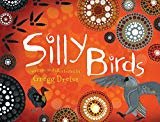'Silly Birds' deftly fuses a traditional Dreaming story of the way a wise young eagle is seduced into becoming a 'wombah thigaraa' - a silly bird - with a bit of advice often repeated in contemporary western popular culture: 'Don't let the turkeys get you down!' The result is a multilayered narrative that is both funny and wise, and is acutely tuned to current concerns with talking rather than listening, and with the consequences of disconnection from community. Maliyan the young eagle is taught by his elders that wisdom comes from watching and listening, rather than speaking. Too much talk and not enough listening would make him a silly bird. Then he meets Wagun, the silly bird, who is always running around, bragging and showing off. Wagun claims to be the fastest, the cleverest, the best at everything - and Maliyan believes him. Like Wagun, he is consumed by his ego and he pleases himself in whatever he does: eating too much, throwing rubbish into the billabong and spoiling the environment that belongs to everyone.
It is only when his parents show how disappointed they are in Maliyan's behaviour that he realises he needs to change. He asks for their advice, and they tell him, 'It's hard to soar like an eagle when you are surrounded by turkeys.' So he begins to listen again, to watch and think before speaking, to respect the needs of others by taking only the food he needs, and by caring for the environment that the whole community shares. Perhaps Wagun is beyond changing - he still acts like a turkey - but other young birds learn the lesson that Maliyan has at last remembered: how to soar like an eagle.
'Silly Birds' can be read as a fable about respect for tradition, and particularly the wisdom of our elders. It supports the traditional Indigenous emphasis on watching and listening as signs of maturity - a theme that brings the narrative into direct interface with contemporary western emphases on hedonistic self-affirmation and self-expression. 'Silly Birds', therefore, challenges the contemporary 'echo chamber', in which young people (and adults) wear headphones or earbuds for hours on end, logging in to tribal posts on social networks that confirm rather than interrogate their values. It can also be read as a fable about the natural environment, the careless sexism of 'bro' culture and materialism.
Finally, a fascinating reading of the text emerges from the popular myth that Benjamin Franklin wanted the turkey rather than the eagle to be the national icon of the United States. Might the homely earthbound turkey have restrained the imperialist ambitions of a society signalled by the power of an eagle? In a 21st century world globalised by the internet, US values are simply part of everyday discourse, so such a reading is less removed from the imagination of a Kamilaroi author than it might at first appear.
Gregg Dreise has created a series of picture books described as ‘morality tales inspired by wise sayings and the knowledge of Aboriginal Elders’. These titles include: ‘Silly Birds’; ‘Kookoo Koobaburra’; ‘Mad Magpie’; and ‘Cunning Crow’.

